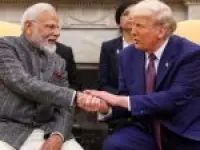
Rekha Sharma's meeting with former Maharashtra Governor Bhagat Singh Koshyari in Mumbai, where she discussed the “rise” in 'love jihad' cases in the state, triggered a massive storm on social media
Rekha Sharma’s tenure as the National Commission for Women (NCW) chief ended on Tuesday. Sharma, who hails from Chandigarh, served as a member of the NCW for three years before assuming the role of its chief in August 2018. Her appointment was met with scepticism by many women activists, who alleged that the NCW had become a “political parking lot.”
Reflecting on her tenure, Sharma described it as a “roller coaster ride” on X. “Today marks the final day of my nine-year tenure as the chairperson of the National Commission for Women (NCW). These nine years have been like a roller coaster ride for me. Coming from a humble background to finishing three terms in the NCW is a long way I have walked,” Sharma said.
She also thanked Prime Minister Narendra Modi for the opportunity to serve as a member and twice as chairperson.
Rekha Sharma’s time as the NCW chief has been marked by controversy and criticism. She was often called out over her alleged inaction on critical issues and controversial statements. She was accused of ignoring atrocities against women, particularly in BJP-ruled states. She was particularly slammed for her perceived inaction during the violence in Manipur last year.
Social Media Storms
Sharma’s controversial social media presence ensured she stayed in headlines. Old tweets kept resurfacing, revealing a pattern of alleged misogynistic, bigoted, and derogatory comments. In a 2012 tweet, Sharma referred to PM Modi as “a deaf and mute person whose life revolves around mentally challenged women.”
As X users dug out her old tweets and tagged her, she alleged that her account was hacked and someone tweeted against PM Modi from her account.
Another tweet from 2013 targeted Congress chief Sonia Gandhi, suggesting she be taken to a “mental asylum” for her “mental health.” In 2015, Sharma tweeted about Zee’s Zindagi TV becoming a “Muslim channel” due to its matrimonial ads. The same year she called Rahul Gandhi “Pappu” while praising PM Modi as “India’s pride.”
AAP leader Atishi questioned her ability to stand up for women given her own “vulgar, cheap, and anti-woman mindset.” Atishi stated, “If a woman who herself has a vulgar, cheap and anti-woman mindset presides over an institution that has to stand up for women’s rights, what expectation can we have from it? Will she stand up for women, will she take action against vulgar Twitter trolls, will she take action when women are harassed, against rapists?”
“Love Jihad”
Sharma’s meeting with then Maharashtra Governor Bhagat Singh Koshyari in 2020, where she discussed the “rise” in ‘love jihad’ cases, also drew severe criticism. “Love Jihad” is a term used by right-wing groups to describe alleged efforts by Muslim men to convert Hindu women through marriage, a theory without legal or factual basis. The term has been condemned for undermining secularism and promoting communal discord. The government has explicitly stated that there is no data to support claims of love jihad.
Union Minister of State for Home G Kishan Reddy had said Article 25 of the Constitution provides for the freedom to profess, practice and propagate religion subject to public order, morality and health.
“The term ‘Love Jihad’ is not defined under the extant laws. No such case of ‘Love Jihad’ has been reported by any of the central agencies,” he said in reply to a written question.
The hashtag #SackRekhaSharma trended on social media, with many demanding her resignation.
Prominent lawyer Karuna Nundy tweeted, “Having installed a deeply misogynist, bigoted and downright sleazy NCW chief, the Modi Government clearly doesn’t care two hoots about women’s rights.”
Allegations of Coercion
In May, the Trinamool Congress (TMC) filed a complaint with the Election Commission of India against Sharma and BJP leaders, accusing them of coercing women in Sandeshkhali to sign blank papers used to file false rape complaints. The TMC alleged that this was part of a conspiracy involving forgery, cheating, fraud, intimidation, and criminal conspiracy.
An interview shared on social media purportedly showed a woman from Sandeshkhali revealing that Sharma and BJP members coerced women into signing blank papers.
“The revelation of a deep-rooted conspiracy involving NCW’s Chairperson Smt. Rekha Sharma and BJP leaders coercing innocent, uneducated women of Sandeshkhali to sign blank papers for filing false rape complaints, is a stark betrayal of trust by the member(s) of NCW,” the complaint read.
International Criticism
Sharma’s tenure also attracted international attention following the gang-rape of a Spanish tourist in Jharkhand. The incident, which sparked international outrage, led to a heated social media exchange between Sharma and US-based writer David Josef Volodzko. Volodzko criticised the safety of women in India, based on his experiences and interactions with female travellers. Sharma responded by accusing Volodzko of defaming India, insisting that the country took women’s safety seriously.
“Did you ever report the incident to Police? If not than you are totally an irresponsible person. Writing only on social media and defaming whole country is not good choice,” Sharma said.
Volodzko countered by highlighting Sharma’s own failures in addressing women’s safety and accused her of defaming India through her inaction. “And yet here she is with the gall to accuse me of defaming India. Sharma, it is you who defame India by presiding over a group called the National Commission for Women and doing nothing about the issue…and then criticizing people like me for drawing attention to this important matter,” he added.
Controversial Recommendations
Before becoming NCW chief, Sharma had sparked controversy by calling for the abolition of “confessions” in churches, citing potential blackmail of women. The government distanced itself from her proposal, with former Union minister Alphons Kannanthanam, from Kerala, stating that the Modi government had no connection to Sharma’s stance.













